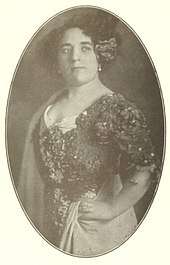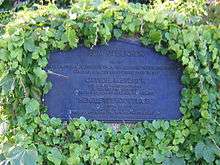Ottilie Metzger-Lattermann
Ottilie Metzger-Lattermann also formerly Ottilie Metzger-Froitzheim (15 July 1878 – February 1943) was a German contralto who was a famous performer of works by Wagner during the 1910s, and who after her retirement was murdered in Auschwitz.[1]

Career
Matzger was born in Frankfurt. Her first husband was the author Clemens Froitzheim. In Hamburg she met the bass-baritone Theodor Lattermann who became her second husband. From 1901 until 1912, she sang at Bayreuth Festival, where her Erda in Der Ring des Nibelungen was esteemed.[2]
She was a student of Selma Nicklass-Kempner, Georg Vogel and Emanuel Reicher (acting). Her debut was 1898 in Halle, followed by engagements in Cologne, then from 1903 to 1915 first contralto with the Hamburg State Opera and played opposite Enrico Caruso. Then followed Dresden, Bayreuth Festival, Vienna State Opera, Saint Petersburg, Prague, Zurich Opera, Amsterdam, Munich, Budapest, Royal Opera House Covent Garden and tours with conductor Leo Blech in the USA. This ended in 1925 with the illness of Theodor who died on 4 March 1926 aged 46. From 1927 she taught singing at the Stern Conservatory in Berlin, where she herself had studied.
Metzger-Lattermann continued to perform as a Lieder recitalist, often accompanied by Richard Strauss and Hans Pfitzner. She gave her last concerts in 1933 under Bruno Walter in Berlin and Otto Klemperer in Dresden, with the seizure of power by Hitler.
After 1933, under the Nazi regime, Metzger-Lattermann continued to perform for Jewish audiences, on at least one occasion in a Lieder evening with the baritone Erhard Wechselmann, who was also to perish in Auschwitz.[3]
In 1933, the American theatre impresario George Blumental (a former associate of Oscar Hammerstein I, who in 1917 had tried to set up theatres for American troops in Paris), tried to arrange with Georg Hartmann and Arthur Hirsch to bring over conductor Blech and a troupe of 12 Jewish opera singers to present Wagner's Ring in New York. Hirsch's assistant, Otto Metzger, was Ottilie's brother and Ottilie was on the list.[4] Blumental's plans came to nothing, partly due to the unavailability of Blech, Klemperer, and Walter.

Metzger-Lattermann and her daughter fled to Brussels in 1939, but there were later rounded up by the Nazis and sent to the camps. She died in Auschwitz. The exact circumstances of the deaths of herself and her daughter are unknown.
Bayreuth memorial
During the 1970s, a Bayreuth antiquarian bookseller, Peer Baedeker petitioned Winifred Wagner for a plaque to "Richard Breitenfeld, Henriette Gottlieb, Ottilie Metzger-Lattermann – Honoured as festival singers – Murdered in Nazi concentration camps" to be installed at Bayreuth.[5]
Recordings
- Richard Wagner, Siegfried, "Stark ruft das Lied" (1908), Opera Nederland, profile, photo (in Dutch)
References
- cantabile-subito.de Biography with photos. Recording: "In questa tomba oscura" (Beethoven)
- Peter Heyworth, Otto Klemperer, His Life and Times: 1885–1933, 1996. p. 103 footnote
- Jüdisches Musik- und Theaterleben unter dem NS-Staat. Stephan Stompor, Andor Izsák, Susanne Borchers, 2001. "Zwei Wochen danach gab Ottilie Metzger-Lattermann mit dem Bariton Erhard Wechselmann einen Lieder- und Duette-Abend." (Two weeks later, Metzger-Lattermann gave a concert with Wechselmann.)
- Blumenthal, George; Menkin, Arthur H. (1936). My Sixty Years in Show Business: A Chronicle of the American Theater, 1874–1934. F. C. Osberg. pp. 227, 232, 308.
I phoned Ottilie Metzger-Lattermann (widow of Theodor Lattermann and sister of Otto Metzger). She was glad to hear that there were prospects of her going back to America and invited me for lunch at her home on Sunday.
- Opera Vol. 48, 1997. pp. 914–5. "He [Wolfgang Wagner] has not even been willing to have a modest memorial for the three Bayreuth singers who perished in concentration camps. The proposal for a memorial plaque was proposed to Wolfgang ages ago by a retired singer and Bayreuth antiquarian bookseller, Peer Baedeker. And therein lies a revealing story. When the centenary festival opened in 1976 with a wreath-laying ceremony at Wagner's grave, Baedeker placed his own wreath with a ribbon attached, with the words: 'In memory of Richard Breitenfeld, Henriette Gottlieb, Ottilie Metzger-Lattermann – Honoured as festival singers – Murdered in Nazi concentration camps.' Within 24 hours of the ceremony, the ribbon had vanished. An article about the incident, which later appeared in an Israeli newspaper, was sent to Winifred, who wrote the following ineffable letter to Baedeker: 'Herr Heinrich Schaar in Munich sends me from time to time cuttings from the Israel Nachrichten, including this one. ... Herr Schaar appears to suspect that this was my doing or at my behest, since otherwise he would not have sent me the press cutting. In the first place I had no idea you had laid a wreath, and in the second I seldom go to RW's resting place; since it is now permanently open to the public, it is never possible to visit the grave alone. I myself never heard Frau Metzger-Lattermann in Bayreuth, but I know that my husband had a very high impression of her. Frau Gottlieb sang here in my time and I had a high opinion of her as well. Herr Breitenfeld is unknown to me. But were all three really killed at Auschwitz? I would doubt that in the case of Frau Lattermann, since she must have been terribly old. With best wishes, also to your wife, whom I recently greeted in front of Wahnfried.' – The casualness of this brush-off, the brutal indifference to the murder of three old singers speaks volumes about the attitude in Bayreuth to its past. And so the monument that the festival visitor sees today on the Green Hill – the massive copy of the bust of a glowering Wagner made for Hitler by the Nazi sculptor Arno Breker – is, properly viewed, a brazen symbol of Bayreuth's."